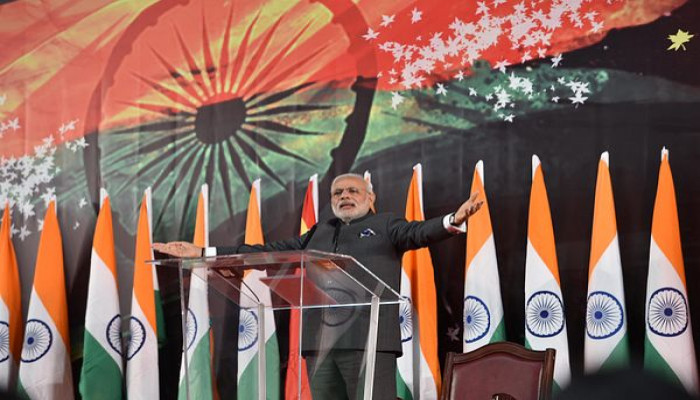Narendra Modi’s Foreign Policy and its Achievements
- In Foreign Policy
- 01:15 PM, Dec 26, 2023
- Nandini Bahri-Dhanda
After the initial shock of Narendra Modi’s nomination as BJP’s Prime Ministerial designate wore off, his critics found their voice again.
They raised questions about whether Narendra Modi with his roots in state politics would be able to navigate the complex world of international relations; how he would communicate in English and one Brown Memsahib even wondered if he knew which fork to use when.
In their snobbery and their own limited worldview, they overlooked the fact that English is the first language of only 17% of the world's population and the rest do, and can, serve their country very well without it.
Cut to 2014.
Prme Minister Modi hit the ground running. It became evident that he had a plan and road map which was unveiled to the country as thousands of miles were notched meeting world leaders and giving speeches in Hindi that retained punch and flavour and sometimes in English as the occasion demanded. What struck most Indians was his confidence, his message and his indefatigable stamina!
It is said that Narendra Modi's foreign policy is characterized by strategic pragmatism, fostering global partnerships based on mutual interests, economic cooperation, and diplomatic assertiveness, with a vision to elevate India's standing in the world.
The successes that stand out assisted by an extremely able External Affairs Minister Dr S Jaishankar are -
Balancing Relations with Major Powers-US and Russia
PM Modi has managed to maintain and strengthen strategic partnerships with the United States reinforcing ties in defence, counter terrorism and economic cooperation.
At the same time, he has maintained India’s traditional ties with Russia despite growing engagements with other major powers.
Case in point under his leadership the country has successfully withstood the pressure exerted by Europe and the US during the ongoing Russia-Ukraine war.
Diversification of Partnerships – Middle East
The Middle East is a crucial economic partner for India and Modi has actively engaged with Middle Eastern countries. His policy places a strong emphasis on economic collaboration including trade investment and infrastructure development. The region serves as a significant source of oil and gas for India, and efforts have been made to secure energy resources through partnerships with Gulf countries. He also recognises the region's strategic importance in terms of security and counter terrorism, particularly in intelligence sharing.
Simultaneously Modi’s engagement with Israel reflects a departure from historical diplomatic norms as historically India has maintained a more discreet relationship with this country. Narendra Modi’s visit to Israel in 2017, the first by any Indian Prime Minister marked a significant diplomatic milestone signalling the growth and growing warmth between the two nations.
Israel has been a consistent supporter of India in international forums and Modi values this support, especially given India's aspirations for a greater role in global affairs. Israel's backing contributes to India's diplomatic influence on the international stage. It can be said that Israel holds strategic importance in Modi's foreign policy with a focus on defence collaboration, technological innovation, economic ties and agricultural cooperation.
This relationship reflects Modi's proactive approach to forging strategic alliances and leveraging mutual strengths for the benefit of India's development and security.
Closer home, Neighbourhood First Policy has paid dividends with Bangladesh. Besides signing The Land Boundary Agreement with Prime Minister Sheikh Hasina which had been delayed for decades, several important Indian-assisted development projects have also been initiated.
The latest among them are Agartala-Akhaura Rail, Khulna-Mongla Port Rail Line and Maitree Super Thermal Power Plant.
Narasimha Rao’s Look East, largely state-centric to Narendra Modi’s people-centric Act East, reflects a strategic maturation in India’s foreign policy moving it beyond passive observation to active participation, aligning with the nation’s evolving role in the global arena.
While mentioning successes one must after all address the Elephants in The Room - Pakistan and China. It can be safely said that the Indian public at large is much more pragmatic and realistic than those who pen a soppy op-ed a month, pining for friendship. In fact, they’d be happy to fix it any other way.
With every soldier slain in combatting terrorism emanating from Pakistan, the resolve of the people to hit back only hardens. Thus, the support for missions such as Balakot.
Also, Indians have learnt to take in stride the sanctimonious finger-wagging of Western middling officials as no one better understands than them, that India's relationship with China and Pakistan is complex and is deeply rooted in historical issues, territorial disputes and different political ideologies.
Narendra Modi’s attitude towards both these countries reflects that of his compatriots - a mix of assertiveness on security matters and willingness to engage in a dialogue under certain conditions. The relationships remain subject to evolving geopolitical dynamics and internal developments.
In the complex labyrinth of foreign affairs common citizens don’t often see palpable results immediately. However, in the past few years ordinary Indians have seen for themselves the tangible change in India’s status among the polity of nations when it came to –
- Vaccine Diplomacy. During the COVID-19 pandemic India positioned herself as a global player and strengthened relations with multiple countries and showcased its commitment to global public health.
- India's impressive record in evacuating its citizens from war-torn or conflict-ridden countries. Some of the most notable examples of successful evacuations recently include Yemen in 2015 and Ukraine in 2022.
- The Indian Diaspora plays a crucial role in Narendra Modi's foreign policy. Particularly in countries with significant Indian communities, the diaspora serves as a bridge for economic ties.
Remittances contribute significantly to India's economy. Modi's policies aim to leverage this economic connection promoting investments and trade partnerships with countries where the Indian diaspora is influential. Engaging with successful Indian professionals entrepreneurs and academics abroad helps project a positive image of India and fosters a cultural exchange. Specific initiatives to engage with the Indian diaspora such as events like Pravasi Bharatiya Divas provides a platform for the members to connect with India.
The Prime Minister also recognises the welfare of the Indian diaspora as a priority and efforts are made to address their concerns protect their rights and provide counsellor services efficiently this includes initiatives the easy access to counsellor services simplification of visa processes and addressing issues related to overseas Indian communities.
Think tanks, domain experts and foreign affairs analysts can go on forever evaluating and dissecting policy, nuance, and ongoing events. However, for the ordinary Indian what has stood out is Aapro Modi’s (as said in Gujarati) unwavering determination and vision for a stronger prosperous India showcased overseas with pride and not the usual hat in hand, apologetic India, assuring the world we know our place and will not step beyond the line they set for us.
Image source: The Diplomat
Disclaimer: The opinions expressed within this article are the personal opinions of the author. MyIndMakers is not responsible for the accuracy, completeness, suitability, or validity of any information on this article. All information is provided on an as-is basis. The information, facts or opinions appearing in the article do not reflect the views of MyindMakers and it does not assume any responsibility or liability for the same.







Comments